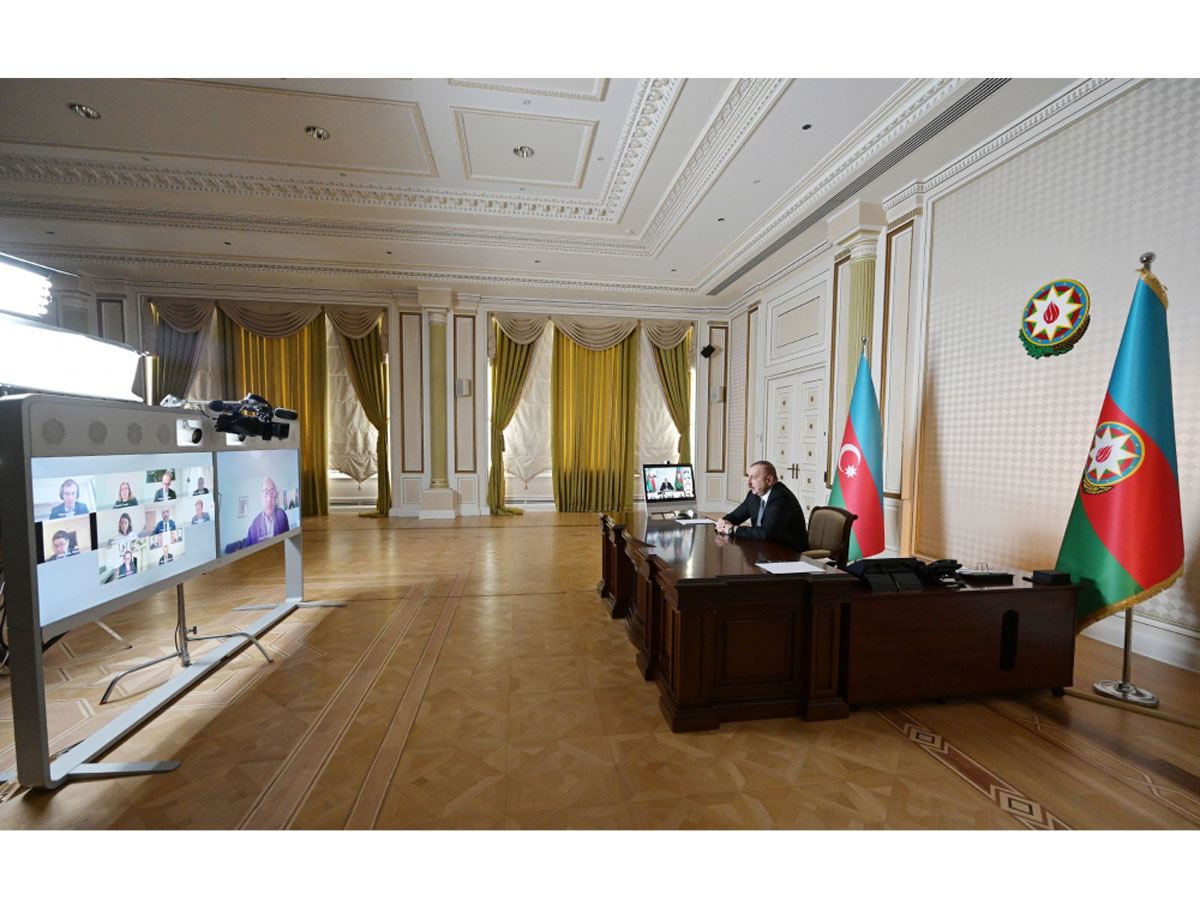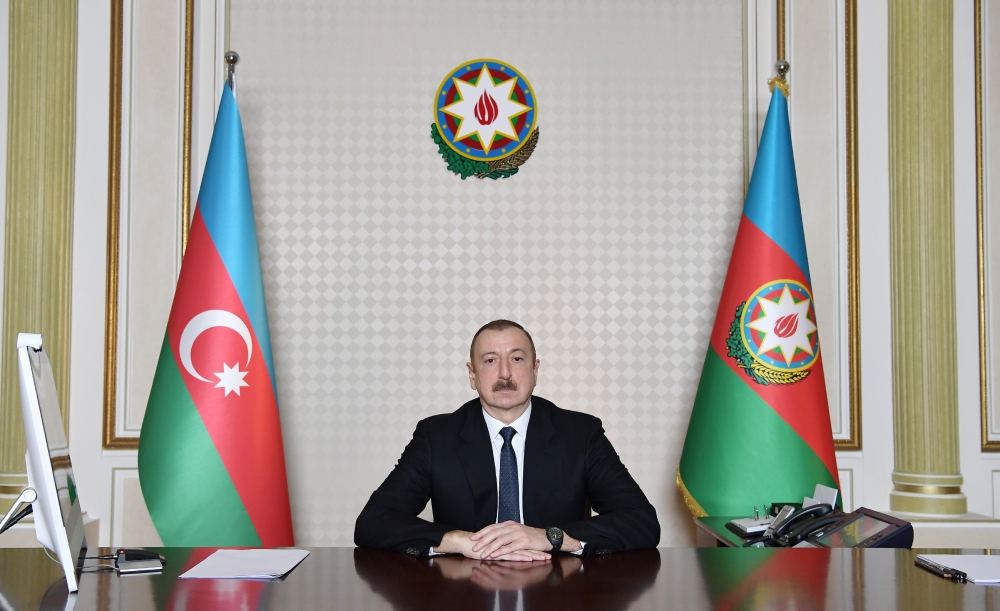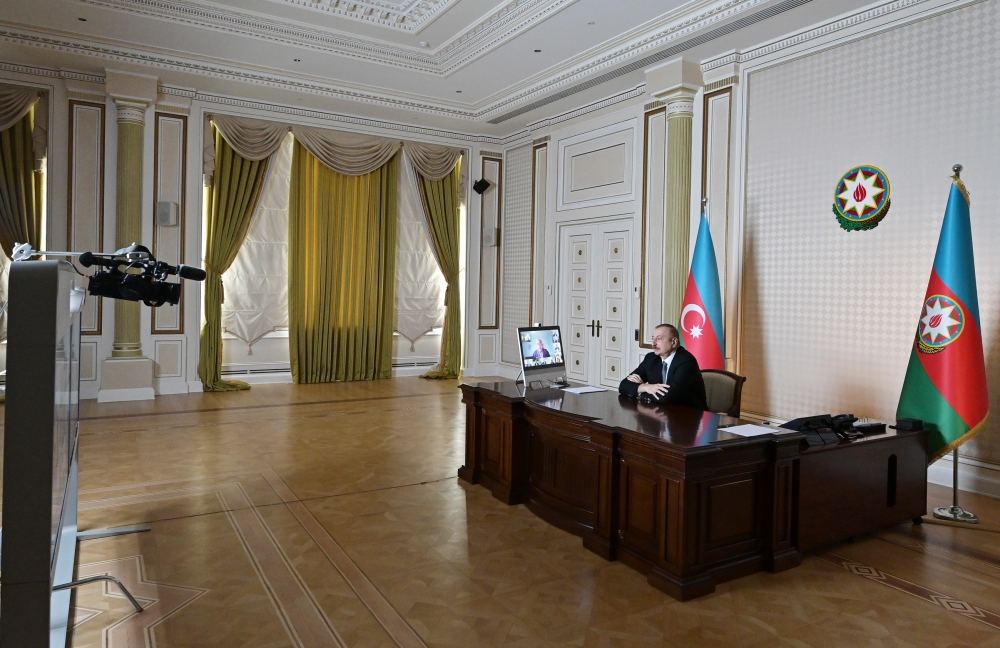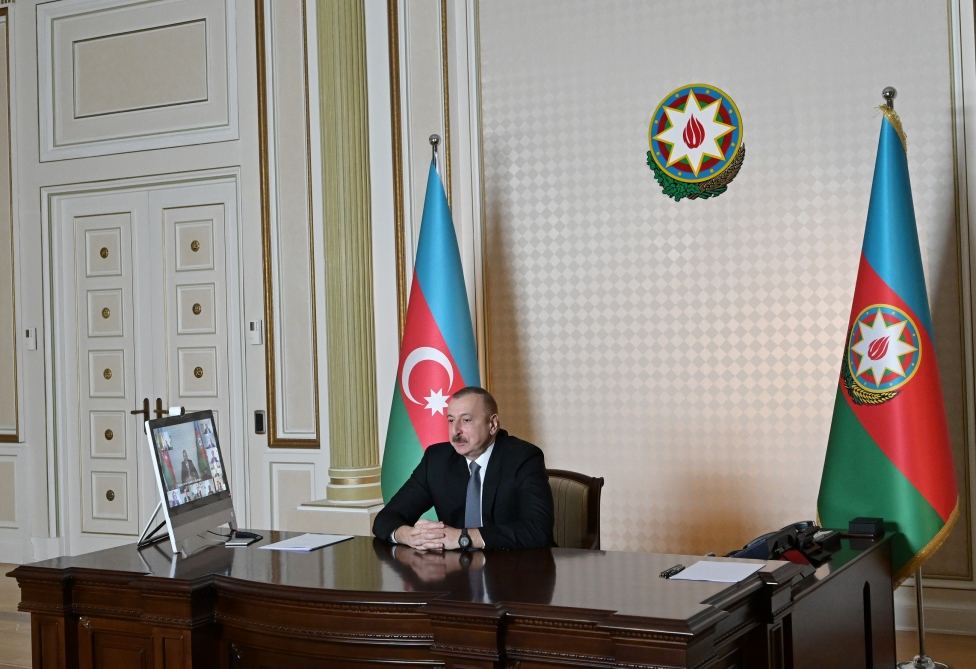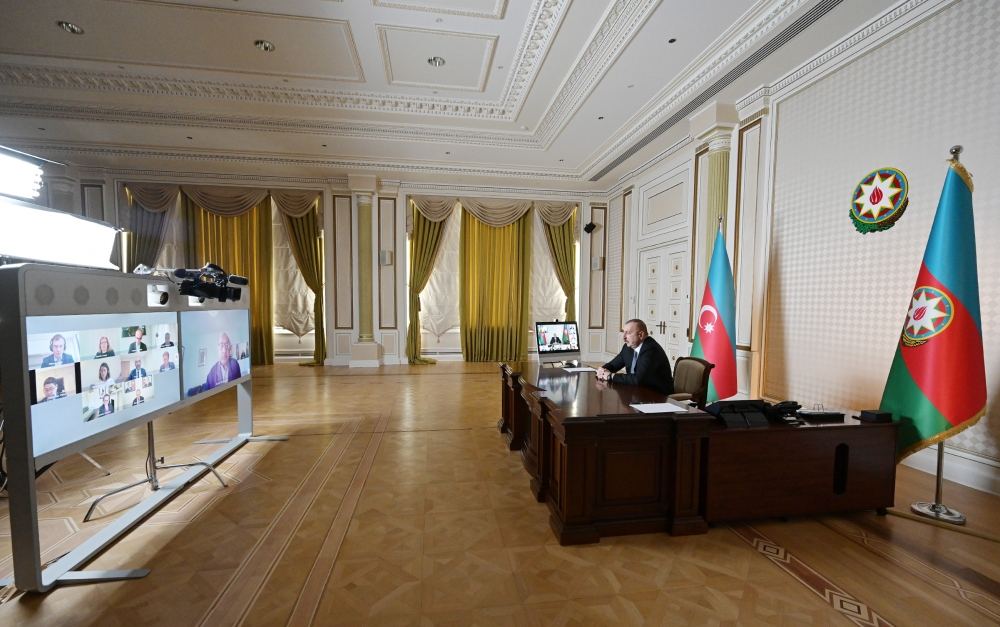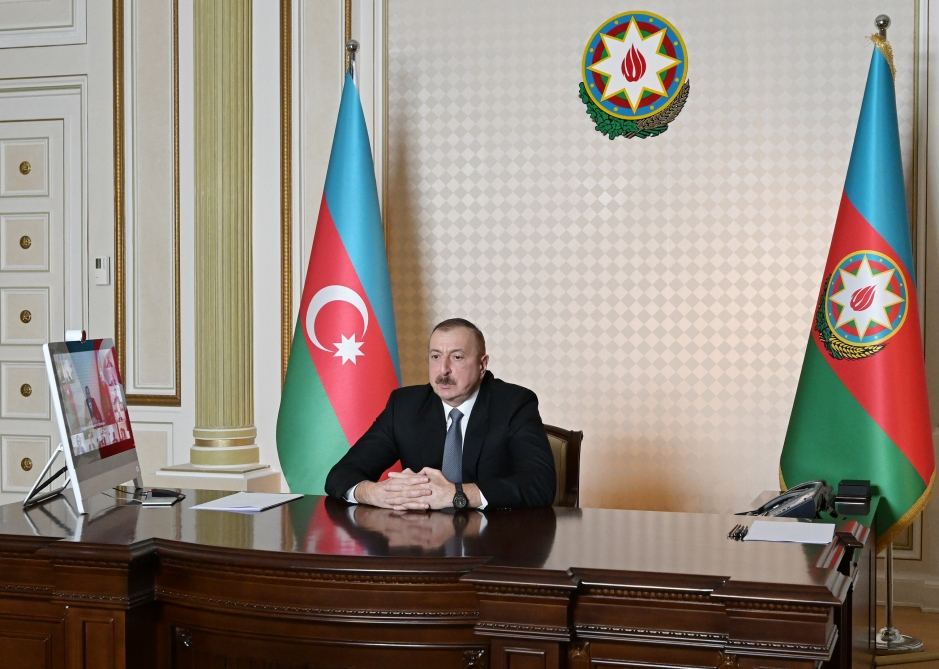BAKU, Azerbaijan, April 28
Trend:
On the initiative of the President of the European Bank for Reconstruction and Development (EBRD), a videoconference has been held between President of the Republic of Azerbaijan Ilham Aliyev and President of the EBRD Suma Chakrabarti.
Greeting the participants of the video conference, President Ilham Aliyev said:
- Mr. President, ladies and gentlemen, good morning!
Suma Chakrabarti: I am very delighted to see you, Mr. President. An expanded delegation of the European Bank for Reconstruction and Development is meeting with you this morning. You probably remember my deputy Jürgen Rigterink. He has recently visited Baku. Pierre Heilbronn, Vice President for Policy, and Alain Pilloux, Vice President for Banking, are also here with us. Further, we have Matteo Patrone, Managing Director for Eastern Europe and the Caucasus, Catarina Bjorlin, Regional Director for the Caucasus, Ivana Duarte, head of the Bank’s Resident Office in Baku, Oleksandr Pavlyuk, Senior Political Counsellor, Svetlana Pirkalo from my office and, finally, Director for European Bank for Reconstruction and Development for countries, your representative and our friend Taskin Temiz.
Mr. President, thank you for your time. This is a very unusual form of meeting. We have repeatedly met both in Baku and in Davos. We live in an amazing and unusual time. First of all, we would like to receive information from you about the situation in Azerbaijan and the measures being taken. After that, my colleagues and I will provide information on what support can be provided to Azerbaijan for an early exit from this crisis. Mr. President, in our opinion, you and your government are coping with this crisis very well. A series of effective measures have been taken in a short period of time and I congratulate you on that. We want to learn about the situation and the measures taken from you.
President Ilham Aliyev: Mr. President, thank you and senior representatives of the European Bank for Reconstruction and Development for this meeting. This is evidence that the European Bank for Reconstruction and Development is a close and reliable partner of Azerbaijan. Therefore, you have come up with such an initiative in difficult times. This will allow us the opportunity to review the ongoing projects, discuss upcoming work and outline plans for further cooperation.
Regarding the question on the virus, we began to take measures based on the real situation from the very beginning. It was very important for us to assess the situation correctly and set up an effective team to deal with this crisis. This virus came to Azerbaijan from outside, we took appropriate steps to prevent it and closed the borders on the basis of an agreement and joint decision with neighboring states. I believe that we made that decision in a timely manner and earlier than similar decisions were taken by other countries. As a result, we gained some time. We see that time is the most important factor in the fight against this virus, because the health system of no country is capable of treating such a large number of infected people. Therefore, our main goals were to gain time, prepare the healthcare system, mobilize specialists and doctors, and build management correctly.
Then we started witnessing the spread of the virus in the country and began to apply restrictive measures in March. We are in constant contact with the World Health Organization, and these contacts are ongoing. We asked the World Health Organization to send specialists to the country to evaluate the situation. They did that and then made a statement that Azerbaijan was taking the necessary measures. They also provided certain recommendations. Later, the World Health Organization issued a statement citing Azerbaijan as an example in the fight against coronavirus.
The decision to introduce restrictive measures was not an easy one. We understood perfectly well that it would create inconveniences for people, a major blow would be dealt to our economic development despite the fact that this year's indicators were quite reassuring. But we had two options. The first option is to protect the life and health of our people and the second is to prioritize the saving of the economy. Therefore, we chose the protection of people's lives from the very beginning. This is the goal of all our work, and we fully mobilized our efforts in this direction. We conducted more than 120,000 tests and are in one of the leading places for their number per capita.
We have set up additional laboratories, which are currently 18. Patients infected with coronavirus are being treated in 22 public hospitals, including the recently commissioned modern hospital with 575 beds. Currently, about 2,000 of our citizens are in quarantine, and this figure is decreasing. These are the people who came from abroad and those who were in contact with them. They have been placed in four- and five-star hotels and have the conditions that meet high standards.
The result of the restrictive measures being occasionally tightened was positive, and we have been observing positive dynamics for two weeks now, i.e. more people are recovering than become infected. The relatively low mortality rate suggests that the work is being done right. We started to relax restrictive measures yesterday.
As for the impact on our economy, it will be negative, of course. At the beginning of the year, we had positive prospects. If you look at the first quarter of the year, growth was still at 1 percent, growth in the non-oil sector was 3 percent and in the non-energy sector 23 percent.
A large package of support for the areas of the private sector worst affected by coronavirus has been provided. The state has paid a large share of the salaries of 600,000 citizens and micro businesses working in the service and other sectors. Along with this, money was paid to 600,000 low-income, unemployed and unofficially employed citizens in accordance with the minimum criterion.
Of course, this is a huge expense for us. If we also consider tax benefits, this figure exceeds 3.5 billion manats, or 2 billion dollars, today. This is a large burden for our budget, because the sharp drop in the oil price will have an adverse impact on our foreign exchange reserves. However, the current period for us is a time when we must increase spending and help vulnerable citizens and entrepreneurs. At the same time, we have doubled the number of paid public jobs this year. Minimum wages are paid here as well, and these are jobs usually related to the public sector. This year the number of such jobs will be 90,000. We have also increased the number of citizens receiving social assistance. Each such family receives 222 manats every month, and their number has reached 80,000. Along with this, self-employment opportunities have been created for 12,000 people – there is also growth of 70 percent here.
So this is the information about the economic and social package presented to our citizens working in areas that have been adversely affected and also have lost their jobs. This is where I want to stop. If you have any thoughts or questions, please ask.
Suma Chakrabarti: Thank you Mr. President. I must note that I am very impressed by the volume of the decisions made and measures taken. Along with this, your steps are very resolute and you act promptly. As you noted, the World Health Organization has also approved this. I recall our first conversation with you, which took place in 2012. We noted a record reduction in poverty in Azerbaijan. Perhaps not many people know about this, but it was one of the highest rates in the world. Of particular note is the work you have done to preserve these achievements and protect the vulnerable. Support for entrepreneurs and help for the families – I think these are steps designed not for the short, but for the medium term.
Let me express my deep appreciation for the completion of the $50 million swap agreement with the Central Bank. This is important for us to finance private sector clients in local currency. This includes our corporate clients, small and medium enterprises and financial institutions. In the coming weeks, we will make payments of 20 million euros under five different transactions. I think that the past few months can be considered a great history for Azerbaijan. Your country is one of a handful countries and perhaps even the only country in the world that has achieved economic growth in the first quarter of the year.
Along with this, given the importance of economic diversification, it is also worth noting the particularly good performance of the non-oil sector in times of crisis. This is a great story, and the day will come when people will make comparisons with Azerbaijan. Our annual meeting will be held next year and we will make an assessment of the countries for the next two-three years. Azerbaijan is already ahead in that respect.
I want to talk about our plans briefly. I have already mentioned five projects, but our work is not limited to that. Compared to previous years, our Azerbaijan investment was low last year because we did not invest in the oil and gas sector and turned our attention to the sphere of medium and small business. This year, I think, we will make large investments in Azerbaijan again, which would be right in terms of crisis response and economic recovery. Under favorable conditions, we plan to invest more than $250 million in Azerbaijan this year. To make these investments, we would need sovereign and sub-sovereign guarantees. I will ask my colleagues to talk about this in detail. These projects mainly cover the public sector, which includes energy, infrastructure and ICT sectors. This also includes the commercialization of some state-owned enterprises. We have discussed a “green package” worth $150 million with you, and we would like to put this topic on the agenda again.
As you know, we previously discussed the “green package” worth $150 million. We would like to engage it and want to know what you think about this. We are doing this work together with your government. As for the electricity network, we suggest investing about 100-200 million euros in its improvement. This is very important in terms of response during the crisis and recovery. At the same time, there will be opportunities for private investment in renewable energy. There is also an idea of the “green city”. Azerbaijan was one of the first countries to join the “green city” initiative. From the point of view of the waste management project, Ganja joined this framework initiative in March. We propose that it be the first “green city” project.
We also have an offer related to Aztelekom. We have an important sub-sovereign investment project of 15-25 million euros. Broadband internet opportunities will expand in the districts. This is also very important. This will be significant for the post-crisis recovery period. We have a program on important new infrastructure. Our Council has reached agreement on that. We express our gratitude to members of the Council. Procedures have been agreed at a high level. We would like to make this amount available to you early, earlier than usual. This will also happen on the basis of that very new program.
As far as irrigation is concerned, you told me a few years ago that this sector is given special importance in the agriculture. In this regard, we would like to implement a pilot project and introduce certain new technologies to this sector. At the same time, we proposed to create an insurance entity in this area, which we will finance. We expect confirmation from the government in this area as well. In addition, extensive technical cooperation is underway. We have established cooperation with a number of local banks so that we can help them in managing risks, solving problem loans, compliance planning and other matters. We work with small and medium-sized enterprises not only through the banking sector, but also directly. What approach should be applied in times of crisis? They need to be supported. This is normal. We are trying to do that too. I must note that we are aware of your desire for a transition to a green economy. Many countries are shying away from this. We are expanding operations in these countries. On the one hand, we can say that the “green economy” is very good, of course, but countries are saying: we are in crisis now. In fact, we call this transformation to green. We try to achieve additional results even in times of crisis, so that the green economy develops. In a nutshell, we will support renewable energy initiatives in the future. The private sector is already showing interest. We must take this into account. We must help also considering the rules regarding energy.
And finally, let me say a few words about state-owned enterprises and the public sector. I think that over the coming week and month we want to move on to the commercialization and privatization of state-owned enterprises in the medium term. This can be done through a state investment holding. We are already working with the government in the legislative field on a formula of partnership between the state and the private sector. We do want to help with the transition to the commercialization and privatization of state-owned enterprises. We are also working on the creation of a new Azerbaijan Development Corporation. In a word, I want to note that we, as the European Bank for Reconstruction and Development, want to “put things back on track” – I don’t know if there is such an expression in the Azerbaijani language. We are doing everything possible so that there is recovery after the crisis in Azerbaijan and other countries, so that this happens as soon as possible. I think that with regard to Azerbaijan, the situation here is better because growth was observed in the first quarter. However, we cannot be content with that. We must significantly intensify the efforts of the government and work with the private sector for this to happen in Azerbaijan. And we will do that. You can see all my colleagues on the screen. All senior managers are here to support you.
President Ilham Aliyev: Thank you, Mr. President. First of all, thank you for the words about our country, the work we are doing in connection with the coronavirus and our economic agenda. We have repeatedly discussed these issues. Then we review the discussions and see that we have already completed a significant part of the planned work. Currently, one of the main goals of our economic development is to reduce the shadow economy. We made good progress last year. This year, we are successfully moving in this direction. Major changes have taken place in Azerbaijan. There have been changes in the Presidential Administration, government, parliament, local executive authorities. They are going on.
As for the plans for the future, I want to thank you personally and leadership of the bank for the importance being attached to Azerbaijan. We are very grateful to you for supporting the most important projects related to infrastructure and energy infrastructure, including the Southern Gas Corridor.
We are moving on to an agreed agenda now. I would also like to comment on your words about our plans. As for the “green program”, we take this issue very seriously. I was informed that we currently have nine projects. The Ganja waste management project has already been given green light. I think that “Ganja-Green City” can be a good example for other large cities of Azerbaijan. As for renewable energy, we are very enthusiastic about that. Here is where we are now. In January, we signed preliminary documents with two experienced renewable energy companies related to the construction of 440-megawatt solar and wind power plants. As far as I know, the European Bank for Reconstruction and Development plans to support them. It is very important that the coronavirus does not affect the plans of these companies. A few days ago, our Minister of Energy informed me that they are serious about their obligations. This, of course, will open the doors wide to other large companies. You probably know that seven major energy companies participated in the bidding. As for the companies that did not go through this time, we offered them the opportunity to conduct further negotiations. I agree with you that during the crisis we must take very serious measures. We should mobilize our efforts and spend more to find an easy way out of the crisis. This is a situation no-one was ready for. How will we overcome this situation? What will be the consequences? How should we evaluate these consequences and plan priorities? Therefore, Mr. President, we will need the support of the bank and your support, expert assistance, because, as I said, no country in the world has encountered such a situation.
You have also mentioned the issue of irrigation. I can tell you that at present this issue may become the top priority in the infrastructure sector for us because all other infrastructure projects have been practically completed. Last year we faced a very serious drought. There is a serious drought this year as well. The volumes of water in storages are as small as ever. Even the older generation can’t recall a drought as bad as last year. Therefore, irrigation is turning into a major infrastructure project. With this aim, I recently set up a state commission headed by our former Minister of Economy Shahin Mustafayev, who you know quite well. Other members of this commission are the Minister of Finance, the Minister of Economy, the Minister of Ecology, the Minister of Agriculture and the head of the state irrigation agency. They will first evaluate our water resources. To exercise control over water resources, we need an electronic system. After that, our infrastructure will be evaluated. Most of it is a legacy of the Soviet era. Sometimes our water losses are as high as 40-50 percent because it is possible to say that these canals have completely lost their qualities. We will invite foreign experts. We rely on your support not only financially, but also from the point of view of expert skill, so that we have projects for both short and medium term. We do not need a long-term strategic plan because in that case we will need five years. We are ready to allocate resources. Of course, it would be wonderful if the bank could support us in that. The main thing is proper project management. As for state-owned enterprises, the Minister of Economy is working on this issue. As already noted, commercialization and partial privatization – perhaps we need to discuss this with you to know what initial steps should be taken. In fact, we are ready for this. There is still a corporate governance issue. Currently, as you know, we are primarily discussing the idea of a parent organization with a view to coordination because one of our problems is related to insufficient coordination between state-owned companies. Even in the transport sector, one of the most promising sectors today, we see that corporate interests of companies prevail over state ones. An additional working group will be established for this purpose.
X X X
The sides then exchanged views on prospects for cooperation between Azerbaijan and the European Bank for Reconstruction and Development.
Azerbaijan’s Minister of Economy Mikayil Jabbarov and Managing Director of the European Bank for Reconstruction and Development for Eastern Europe and the Caucasus Matteo Patrone made speeches at the discussions.

